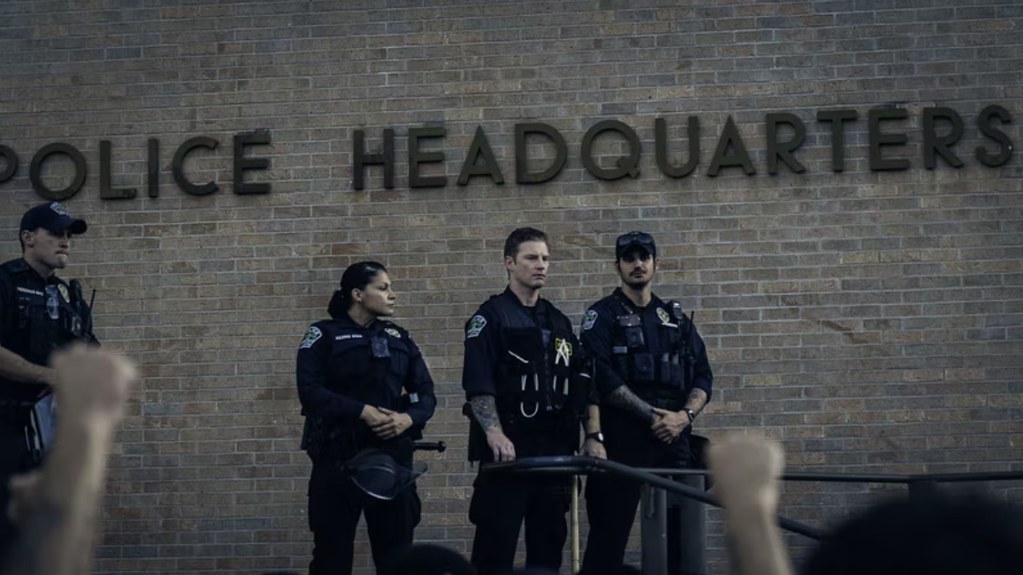Could a person or a newspaper get sued for defamation for posting the name of a possible suspect of a robbery?
For the Sheriff’s Office post, naming someone is likely libelous. For the newspaper post, the newspaper is not likely to be liable for the comments readers make. Someone could claim they are being placed in a false light, but that too depends. Don’t worry, we’ll walk you through the nitty gritty of it.
Let’s say that your teacher, Jake Smith, was named on the Sheriff’s Office Facebook post. He decides to sue because he was not the robber. He is going to sue because naming him on the post was defamation, which means that being named harmed his reputation, deprived him of his right to enjoy social contacts, and harmed his ability to work or make a living. He is a private person and has to prove five things to win a libel lawsuit: (1) the libel was published; (2) the published words were about him; (3) the published words will hurt his reputation; (4) the post was false; and (5) the person he is suing is at fault for the post. Note that there’s a difference between a private person, like Jake, and a public figure, like Ariana Grande. The risk for libel here for Jake is high but not guaranteed. It’s important to note that there’s a difference between someone posting, “It looks like Jake Smith” and “That is Jake Smith. What did he steal?”
For the newspaper, a federal law, the Communications Decency Act states that a provider of an online forum (here, Facebook) cannot be sued for what people say on the platform. However, there are a few exceptions to this! First, if the newspaper posted a poll on Facebook that read, “Who is the robber of the church? A) Jake Smith, B) Peter Brown, or C) Leon Doe.” That would definitely be libel because the publication is providing the content, as opposed to the readers. Second, if Jake was named in a comment and he asked Facebook to take it down, Facebook has a duty to remove the post and look into the matter. It can be added to the site again if it turns out to be true and not libel.
Another issue that could come up is false light. False light essentially means that someone was presented in a way that is not true and damages their reputation. For Jake to win, he would have to prove (1) the false light was published and people can identify him; (2) the post was actually false; (3) the post is offensive to the average person; and (4) the person who posted it must’ve known it was false or acted in reckless disregard of the truth. While this claim sounds good at first, we think Jake doesn’t have the best chance when it comes to the fourth part in his claim because the Sheriff’s Office took great care not to say the person in the photo was the robber. The post is about seeking information, not declaring the person a suspect.
Okay, so, we’ve got both defamation and libel going on. What is defamation? It is a damaging statement that harms a person’s reputation, deprives them of the right to enjoy social contacts, and harms their ability to work or make a living. Libel is a type of defamation (the other one is slander, but don’t worry about that one). Think of defamation as the umbrella and libel falls underneath it. Now, to win a libel lawsuit, a person bringing the lawsuit would have to prove five things:
1. The libel was published
2. The material was about the person bringing the suit (called a plaintiff)
3. The material was defamatory
4. The material was false, and
5. The defendant (the person being sued) was at fault.
It’s important that our person in the scenario, Jake Smith, is a private, everyday person. He’s a teacher, not a public figure like Ariana Grande, who is a super famous pop star with access to the media to defend herself in such a situation. Jake just has to prove the defendant acted negligently and that the statement could’ve been avoided with due diligence.
We’ve got our five factors. Let’s run through them in the scenario where someone commented on the Sheriff’s Office post and said “That’s Jake Smith. What did he steal?”
First, was the libel published? Yes! It was written and posted to the internet. Second, was it about the plaintiff, Jake? Yes! It specifically mentions him. Third, is it defamatory? It depends! If Jake can prove that the post harmed his reputation, deprived him of social contacts, and harmed his ability to work, then yes! But, if he is not able to prove these things, then his claim is going to fail. Fourth, was the statement false? Well, let’s hope that Jake did not steal from the church. If he did, his entire lawsuit fails because the truth is always a defense to libel. If he did not steal from the church, then he wins this factor. Finally, is the defendant at fault? For Jake, a private person, he has to prove that making the post was easily avoidable.
So, all in all, we think a libel lawsuit could be pretty successful, but it depends. It usually does!
Now let’s figure out how this applies to a newspaper’s post. . . .
With the invention of the internet and the seemingly endless list of apps people can download on their iPhones, the government decided to write the Communications Decency Act, which governs all sorts of technological stuff. For our purposes, we are looking at Section 230, which covers whether or not a newspaper can be held liable for users’ online comments. The short answer is generally no, but there are exceptions.
First, if the newspaper is providing the content online and users can select from options, then that could cause the paper to be held liable. An example is our poll from earlier: “Who is the robber of the church? A) Jake Smith, B) Peter Brown, or C) Leon Doe.” People are being named here and the newspaper is providing the content, not the users. But even if it was an open-ended question such as “Who is the robber of the church?” that is still inviting people to make libelous statements. Tread carefully and be mindful of what you post online! This goes for both newspaper websites and users adding comments.
Second, if Jake asked the newspaper to remove a libelous statement from its Facebook page and the newspaper did not, then the newspaper could be sued. By not removing the post, the newspaper is essentially republishing it. If someone asked the newspaper to remove the post, then the newspaper should remove it and look into the matter. If the information turns out to be true, then the post can be put back up at the paper’s discretion without fearing a libel lawsuit.
Also, we should make it clear that if a libelous statement is printed in a newspaper, the newspaper can be held liable even if the quote is coming from someone else and not the paper or a reporter. Why? Because while the newspaper did not make the statement, it published the statement. Reporters have to check whether the information is true before they write and publish their stories. See the difference between a user’s post on Facebook and content printed in a newspaper?
We also mentioned that a false light claim is a possibility!
A false light claim is an invasion of privacy claim where a person is saying that they were cast in a “false light” or falsely implicated as doing something that would harm their reputation. To prove a false light claim in this church robbery situation, Jake would have to prove:
1. The false light was published and people can identify the plaintiff
2. The false light was actually false
3. The false light is highly offensive to the average person, and
4. The defendant must have knowledge, or acted in reckless disregard, of the truth and the false light in which the plaintiff would be place
First, the picture of the man was posted along with comments, and people could connect Jake along with the comments. This factor leans in favor of Jake and false light. Second, as long as Jake didn’t actually rob the church, then he would win the second factor. If he did, well, that’s certainly a huge bummer and also no good for Jake’s false light claim! Third, being linked to a crime is pretty offensive to the average person, so this one is not hard to satisfy.
But, we are hung up on the fourth factor here. The Sheriff’s Office specifically posted about looking for information about a crime, not that the person shown in the photo actually committed the crime. The original post is not accusatory at all and the Sheriff’s Office is not acting in reckless disregard here. So, we think Jake would not win the fourth factor and not be successful in his false light lawsuit.
Have questions about free speech rights?
Send your questions our way, and we'll have our team find you an answer. Keep in mind, we’re not actually your lawyers and aren’t representing you. We can definitely help clear some things up and give you some info, but if you need actual legal help for your situation, you should find a lawyer in your area. And don't worry, any information we collect is only for our own research, and we won’t share it or sell it to anyone.




